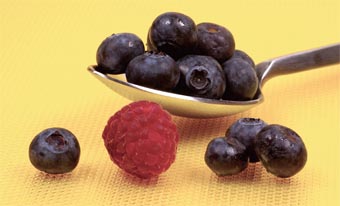
BY 2030, the youngest of the baby boomers will turn 65. How they will cope with the onset of aging - and possibly caring for their elderly parents, as well - can well depend on changes in diet that they make today. Experts agree that controlling food intake is a viable strategy for enhancing cognitive abilities, protecting the brain from damage and counteracting the effects of aging. Whilst there are still mysteries surrounding the fundamental process of memory, research has revealed activities that may enhance memory and promote overall brain health. There are certain "brain foods" that seem to have a benefit on the brain, said John H. Byrne, PhD, who studies the neuronal and molecular mechanisms underlying learning and memory at the University of Texas Health Science Centre at Houston (UTHealth) Medical School. "New research shows that Omega-3 fatty acids, such as those found in salmon and other fish, may build the brain's grey matter. Foods and beverages that are rich in antioxidants may also help keep the brain sharp. For brain food, consider a glass of red wine, some salmon, blueberries, a little bit of chocolate or a cup of green tea," said Dr Byrne, a professor and chairman of the Department of Neurobiology and Anatomy.
Omega-3 especially important Scientists are also learning which omega-3 fatty acids seem to be especially important. One is docosahexaenoic acid, or DHA, which is abundant in salmon. DHA, which reduces oxidative stress and enhances synaptic plasticity and learning and memory, is the most abundant omega-3 fatty acid in cell membranes in the brain. Omega-3 fatty acids - also found in walnuts and kiwi fruit - provide many benefits, including improving learning and memory and helping to fight against such mental disorders as depression and mood disorders, schizophrenia, and dementia, according to a review of 160 studies about food's affect on the brain in Nature Reviews Neuroscience (2008). In contrast to the healthy effects of diets that are rich in omega-3 fatty acids, diets high in trans fats and saturated fats adversely affect cognition, the studies indicate. This may explain why in Okinawa, Japan, where people frequently eat fish and exercise, the lifespan is one of the world's longest, and the population has a very low rate of mental disorders, author Fernando G髆ez-Pinilla noted.
 Housekeeping in the brain
Housekeeping in the brain Eating berries may activate the brain's natural housekeeper for healthy aging, scientists said at the 240th National Meeting of the American Chemical Society (ACS), concluding that berries clean up and recycle toxic proteins linked to age-related memory loss and other mental decline. Shibu Poulose, Ph.D., who presented the report, said previous research suggested that one factor involved in aging is a steady decline in the body's ability to protect itself against inflammation and oxidative damage. This leaves people vulnerable to degenerative brain diseases, heart disease, cancer, and other age-related disorders. Cells called microglia are the housekeepers. In a process called autophagy, they remove and recycle biochemical debris that otherwise would interfere with brain function. With aging, however, microglia fail to do their work, and debris builds up, he explained. "The good news is that natural compounds called polyphenolics found in fruits, vegetables and nuts have an antioxidant and anti-inflammatory effect that may protect against age-associated decline," said Poulose, who is with the U. S. Department of Agriculture-Agricultural Research Service (USDA-ARS) Human Nutrition Research Centre on Aging in Boston. Poulose did the research with the late James Joseph, Ph.D., who pioneered research on the role of antioxidants in fruits and nuts in preventing age-related cognitive decline.
Black is beautiful Health-conscious consumer
Nike Zoom Live 2017 BY 2030, the youngest of the baby boomers will turn 65. How they will cope with the onset of aging - and possibly caring for their elderly parents, as well - can well depend on changes in diet that they make today. Experts agree that controlling food intake is a viable strategy for enhancing cognitive abilities, protecting the brain from damage and counteracting the effects of aging. Whilst there are still mysteries surrounding the fundamental process of memory, research has revealed activities that may enhance memory and promote overall brain health. There are certain "brain foods" that seem to have a benefit on the brain, said John H. Byrne, PhD, who studies the neuronal and molecular mechanisms underlying learning and memory at the University of Texas Health Science Centre at Houston (UTHealth) Medical School. "New research shows that Omega-3 fatty acids, such as those found in salmon and other fish, may build the brain's grey matter. Foods and beverages that are rich in antioxidants may also help keep the brain sharp. For brain food, consider a glass of red wine, some salmon, blueberries, a little bit of chocolate or a cup of green tea," said Dr Byrne, a professor and chairman of the Department of Neurobiology and Anatomy. Omega-3 especially important Scientists are also learning which omega-3 fatty acids seem to be especially important. One is docosahexaenoic acid, or DHA, which is abundant in salmon. DHA, which reduces oxidative stress and enhances synaptic plasticity and learning and memory, is the most abundant omega-3 fatty acid in cell membranes in the brain. Omega-3 fatty acids - also found in walnuts and kiwi fruit - provide many benefits, including improving learning and memory and helping to fight against such mental disorders as depression and mood disorders, schizophrenia, and dementia, according to a review of 160 studies about food's affect on the brain in Nature Reviews Neuroscience (2008). In contrast to the healthy effects of diets that are rich in omega-3 fatty acids, diets high in trans fats and saturated fats adversely affect cognition, the studies indicate. This may explain why in Okinawa, Japan, where people frequently eat fish and exercise, the lifespan is one of the world's longest, and the population has a very low rate of mental disorders, author Fernando G髆ez-Pinilla noted.
BY 2030, the youngest of the baby boomers will turn 65. How they will cope with the onset of aging - and possibly caring for their elderly parents, as well - can well depend on changes in diet that they make today. Experts agree that controlling food intake is a viable strategy for enhancing cognitive abilities, protecting the brain from damage and counteracting the effects of aging. Whilst there are still mysteries surrounding the fundamental process of memory, research has revealed activities that may enhance memory and promote overall brain health. There are certain "brain foods" that seem to have a benefit on the brain, said John H. Byrne, PhD, who studies the neuronal and molecular mechanisms underlying learning and memory at the University of Texas Health Science Centre at Houston (UTHealth) Medical School. "New research shows that Omega-3 fatty acids, such as those found in salmon and other fish, may build the brain's grey matter. Foods and beverages that are rich in antioxidants may also help keep the brain sharp. For brain food, consider a glass of red wine, some salmon, blueberries, a little bit of chocolate or a cup of green tea," said Dr Byrne, a professor and chairman of the Department of Neurobiology and Anatomy. Omega-3 especially important Scientists are also learning which omega-3 fatty acids seem to be especially important. One is docosahexaenoic acid, or DHA, which is abundant in salmon. DHA, which reduces oxidative stress and enhances synaptic plasticity and learning and memory, is the most abundant omega-3 fatty acid in cell membranes in the brain. Omega-3 fatty acids - also found in walnuts and kiwi fruit - provide many benefits, including improving learning and memory and helping to fight against such mental disorders as depression and mood disorders, schizophrenia, and dementia, according to a review of 160 studies about food's affect on the brain in Nature Reviews Neuroscience (2008). In contrast to the healthy effects of diets that are rich in omega-3 fatty acids, diets high in trans fats and saturated fats adversely affect cognition, the studies indicate. This may explain why in Okinawa, Japan, where people frequently eat fish and exercise, the lifespan is one of the world's longest, and the population has a very low rate of mental disorders, author Fernando G髆ez-Pinilla noted.  Housekeeping in the brain Eating berries may activate the brain's natural housekeeper for healthy aging, scientists said at the 240th National Meeting of the American Chemical Society (ACS), concluding that berries clean up and recycle toxic proteins linked to age-related memory loss and other mental decline. Shibu Poulose, Ph.D., who presented the report, said previous research suggested that one factor involved in aging is a steady decline in the body's ability to protect itself against inflammation and oxidative damage. This leaves people vulnerable to degenerative brain diseases, heart disease, cancer, and other age-related disorders. Cells called microglia are the housekeepers. In a process called autophagy, they remove and recycle biochemical debris that otherwise would interfere with brain function. With aging, however, microglia fail to do their work, and debris builds up, he explained. "The good news is that natural compounds called polyphenolics found in fruits, vegetables and nuts have an antioxidant and anti-inflammatory effect that may protect against age-associated decline," said Poulose, who is with the U. S. Department of Agriculture-Agricultural Research Service (USDA-ARS) Human Nutrition Research Centre on Aging in Boston. Poulose did the research with the late James Joseph, Ph.D., who pioneered research on the role of antioxidants in fruits and nuts in preventing age-related cognitive decline. Black is beautiful Health-conscious consumerNike Zoom Live 2017
Housekeeping in the brain Eating berries may activate the brain's natural housekeeper for healthy aging, scientists said at the 240th National Meeting of the American Chemical Society (ACS), concluding that berries clean up and recycle toxic proteins linked to age-related memory loss and other mental decline. Shibu Poulose, Ph.D., who presented the report, said previous research suggested that one factor involved in aging is a steady decline in the body's ability to protect itself against inflammation and oxidative damage. This leaves people vulnerable to degenerative brain diseases, heart disease, cancer, and other age-related disorders. Cells called microglia are the housekeepers. In a process called autophagy, they remove and recycle biochemical debris that otherwise would interfere with brain function. With aging, however, microglia fail to do their work, and debris builds up, he explained. "The good news is that natural compounds called polyphenolics found in fruits, vegetables and nuts have an antioxidant and anti-inflammatory effect that may protect against age-associated decline," said Poulose, who is with the U. S. Department of Agriculture-Agricultural Research Service (USDA-ARS) Human Nutrition Research Centre on Aging in Boston. Poulose did the research with the late James Joseph, Ph.D., who pioneered research on the role of antioxidants in fruits and nuts in preventing age-related cognitive decline. Black is beautiful Health-conscious consumerNike Zoom Live 2017
 iConnectHub
iConnectHub
 Login/Register
Login/Register Supplier Login
Supplier Login


























